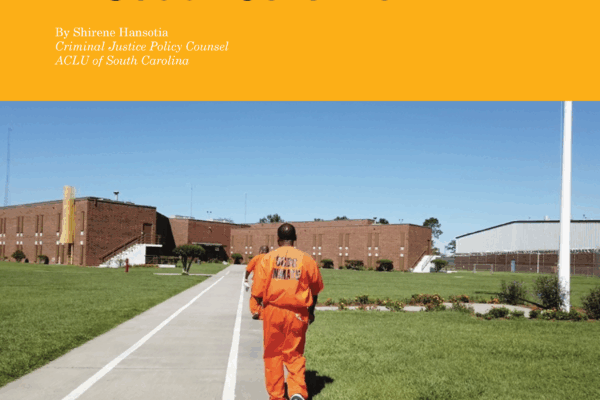For half a century South Carolina has embraced draconian sentencing laws that have destroyed lives and communities and contributed to the explosive growth of both jail and prison populations. It doesn’t have to be this way. It is past due for South Carolina to enact meaningful sentencing reform and safely reduce the state’s prison population.
That is the conclusion of a new report we released today. The report, Reevaluating Crime and Punishment in South Carolina, documents how specific policy decisions by South Carolina lawmakers have led to the expansion of the state’s prison population, and how corresponding cuts to prison programs and services, including mental health and medical services, coupled with severe understaffing has created horrific conditions of confinement across South Carolina Department of Corrections facilities. The report also shows the racial disparities that have accompanied the spike in state incarceration rates. The report concludes with a series of proposals for the state’s corrections and political leaders designed to build safer and more just communities throughout South Carolina.
South Carolina's large prison populations coupled with lack of basic services and chronic prison-staff shortage impacts every aspect of prison life, from the inability to provide adequate security, to the dearth of educational, vocational, and re-entry programs, and insufficient delivery of medical, mental-health, and addiction-recovery services that, in turn, affect the stability and security of incarcerated people and staff alike. The dire conditions inside South Carolina prisons are a natural and predictable result of South Carolina’s drive towards mass incarceration over the past half century. Corrections experts, families with loved ones in prisons, and prison advocates have been sounding the alarm for decades about the dire need for relief from inhumane prison living conditions. Most of the time, these cries for help have been downplayed or ignored altogether. Without changes, more uprisings like that at the Lee Correctional Institution in 2018 – the deadliest prison uprising in the last 25 years - are inevitable.
This overreliance on incarceration to remedy societal problems hit Black and Brown communities the hardest. Black South Carolinians represent 26 percent of South Carolina’s population, but comprise approximately 61 percent of the state prison population today. As of 2017 the imprisonment rate of Black adults in South Carolina was more than five times the rate of whites. For generations, our political leaders have used racist code words like ‘law and order’ and ‘tough on crime’ to justify South Carolina’s harsh sentencing laws. The outcome of these racist policies is predictable - Black and Brown people are incarcerated at staggering rates compared to white people.
After decades of commitment to these draconian policies, there is an emerging bipartisan consensus that the war on drugs and harsh sentencing regimes are both unsustainable and unwise. Let’s be clear, our lawmakers made a choice to cage tens of thousands of people, and do so in horrific conditions. Our lawmakers must make new choices. They must not only end the war on drugs and other failed policies, but also prioritize investments that will improve public safety and health, like ensuring all people have a roof over their head, comprehensive healthcare, a living wage, and quality public education. In short, to create truly safe and just communities for all we must invest in people and communities instead of police and incarceration.
The report can be found here.

